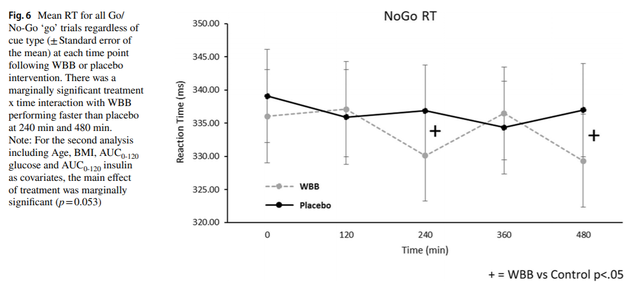Placebo
Blueberries Improve Cognitive Performance in Healthy Adults
New placebo-controlled study found blueberries effective in middle-aged persons.
Posted August 9, 2020 Reviewed by Ekua Hagan

A study titled “Improved metabolic function and cognitive performance in middle-aged adults following a single dose of wild blueberry” [1] was published on the 3rd of August 2020 in the European Journal of Nutrition. This placebo-controlled study was the first to examine the cognitive effects of blueberries in healthy middle-aged (40–65 years old) adults.
Purpose of the study
Previous research has shown that berries in general, and blueberries in particular, can enhance cognitive performance in healthy children, young adults, and older adults. [3]
This study is the first of its kind and aimed to explore whether one-time use of whole fruit wild blueberry powder acutely enhances cognitive performance in middle-aged adults compared with a placebo.
Standardization of the blueberry product
“The wild blueberry beverage consisted of 25 g freezedried whole wild blueberry (WBB) powder (~1-cup fresh weight) […] The WBB powder was mixed with water, frozen lemonade concentrate, and unsweetened Kool-aid for colour and flavouring. The placebo beverage was matched as closely as possible for energy and macronutrient content using the same ingredients minus the WBB powder.”
Study design
The study was a randomised, double-blind, placebo-controlled, balanced crossover design trial.
That the study was a double-blind trial means that for each time a participant took a pill, they were unaware of whether they received a placebo, and so were the researchers. The placement of participants into the different groups was also out of the control of both the researchers and participants (grouping was randomised). All participants received both the placebo and the blueberry powder, with half receiving placebo first and the other half the blueberry powder. The participants were given the other intervention on their next visit during another day (this is called a crossover design).
The 35 participants that finished the study were between 40 and 65 years old (average 50.9). Twenty-three of them were female.
Psychological tests
The cognitive performance of the participants was measured 2, 4, 6, and 8h after the ingestion of either placebo or blueberries.
Two tasks measuring executive abilities and one test of episodic memory were used in this study.
An Auditory Verbal Learning Task was used to measure learning, recall and
recognition memory.
The cued Go/No-Go task was used to examine response inhibition and reaction time.
The Modified Attention Network Task assessed the susceptibility to response interference (tendency to become distracted).
Essentially, three previously validated tests were used to measure various aspects of cognitive performance, with a focus on executive abilities and episodic memory, at each timepoint of cognitive testing.
All of these tests have been used previously in other placebo-controlled studies to assess the efficacy of potential cognitive enhancers. [2]
These tests of the participants’ mental performance were used to assess the acute cognitive effects of blueberries, especially in cognitively demanding tasks.
Results
Wild blueberry consumption had a positive impact on memory and executive functions:
“WBB cognitive performance was improved in comparison to placebo on delayed recognition memory and aspects of executive function. Importantly, these benefits were found on more demanding elements of the tasks where some form of additional cognitive effort was required.”
There were also improvements in measures of reaction time and response inhibition, which are involved in executive functioning and sustained attention. These effects were considered independent of cognitive fatigue by the researchers.

Taken together, these findings suggest that blueberries can enhance several aspects of cognitive performance in healthy middle-aged adults, especially in cognitively demanding situations.
The results are in line with previous studies on the potential cognitive-enhancing effects of foods and extracts containing flavonoids and polyphenols.
“… different cognitive domains appear affected following acute flavonoid/polyphenol interventions dependent on the age of the participants tested with memory improvements generally being observed in children and older adults, executive function improvements in children, younger, and middle-aged adults, and working memory improvements more typically observed in younger and middle-aged adults …”
There were no negative side effects reported. This could be considered a limitation of the study. However, there’s likely a good reason why the researchers didn’t include any information about side effects. Blueberries have been tested by a lot of people in more or less scientific contexts before and have been found to be generally safe. [3]
Conclusion
The researchers concisely summarized their findings:
“The findings provide further support for the efficacy of wild blueberry on improving cognitive outcomes within this age group, particularly where there is increased cognitive demand.”
It can be concluded that blueberries did enhance several aspects of cognitive performance, including reaction time, episodic memory, and executive functioning in this well-designed healthy human placebo-controlled study.
Should you use blueberries for cognitive enhancement?
Considering that blueberries are generally very safe if used in appropriate doses, their promising cognitive-enhancing properties are indeed a good reason to eat blueberries on a daily basis.
The dose used in this study was equivalent to about 1 cup of blueberries. Previous studies [4] that demonstrated beneficial effects in other age-groups used 24–30g of blueberries, so that’s a good place to start.
This blog post was originally published at blog.nootralize.com, it is not a substitute for professional medical advice, diagnosis, or treatment.
References
[1] Whyte, A.R., Rahman, S., Bell, L. et al. Improved metabolic function and cognitive performance in middle-aged adults following a single dose of wild blueberry. Eur J Nutr (2020). https://doi.org/10.1007/s00394-020-02336-8
[2] https://nootralize.com/tests




